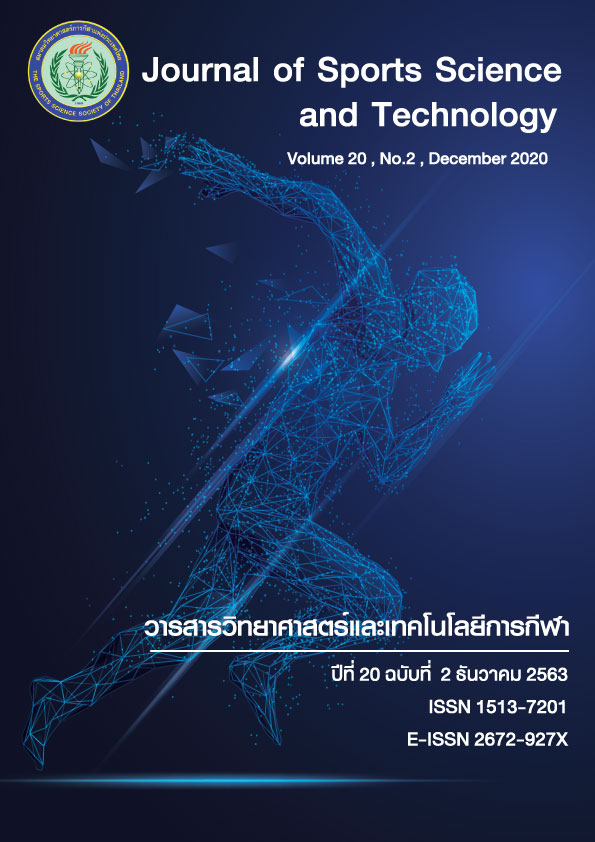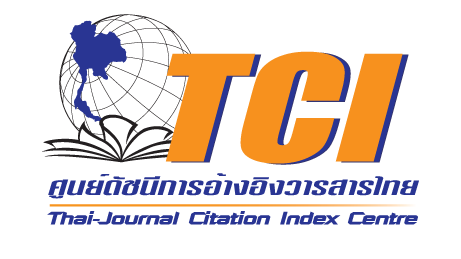TRANSLATION AND FACTORIAL VALIDATION OF THE MINDFULNESS INVENTORY FOR SPORT IN THAI VERSION (MISt)
Keywords:
Mindfulness, Translation and adaptation, Psychometrics, Cross-cultureAbstract
This study was to translate and to validity of the Mindfulness Inventory for Sport (MIS) into Thai version. The sample of 572 Thai student-athletes of University (62.8% males and 37.2% females, they play in diverse sports with a mean age of 19.7 years; an average sport experience of 6 years); and practice 4.8 days per week and training 3.2 hours per day. Convenience random sampling was used for collect data. Moreover, the data collection was used online questionnaire. The statistic was used confirmatory factor analysis (CFA) to analyze data.
The results showed that the mindfulness inventory in sport of Thai version had a reliability of 0.93 and a model structure consisting of 15 sub-questions and 3 factors. The model parameter estimation was (57) = 107.42, p< 0.05, NFI = 0.99, ECVI = 0.42, SRMR = 0.059, RMSEA = 0.039., that show adequate fit. Moreover, other indicators is similar with the original research. The Thai language version of the mindfulness inventory in sport model therefore presents the same structure as the original and shows similar measurement characteristics. Therefore, this study indicates that the mindfulness inventory in sport of Thai version are accurate and can be apply to used and to assess the mindfulness inventory in sport of Thai athletes.
References
2. Bishop SR, Lau M, Shapiro S, Carlson L, Anderson ND, Carmody J, Segal ZV, Abbey S, Speca M, Veltin, D, and Devins G. Mindfulness: a proposed operational definition. Clin Psy. 2004; 9: 76-80.
3. Gardner FL, Moore ZE. The psychology of enhancing human performance: The Mindfulness-Acceptance-Commitment (MAC) approach. New York: Springer. 2007.
4. Moran AP. Cognitive psychology in sport: progress and prospects. Psy Sport Ex, 2009; 10: 420-426.
5. Gardner FL, Moore ZE. A Mindfulness-Acceptance-Commitment (MAC) based approach to athletic performance enhancement: theoretical considerations. B Thera. 2004; 35: 707-723.
6. Aherne C, Moran AP, Lonsdale C. The effects of mindfulness training on
athletes’flow: an initial investigation. Sport Psy. 2011; 25: 177-189.
7. Bernier M, Thienot E, Codron R, Fournier JF A multi-study investigation examining the relationship between mindfulness and acceptance approaches and sport performance. Journal of Clin Spo Psy. 2009; 3: 320-333.
8. Baer, R. A., Smith, G. T., & Allen, K. B. (2004). Assessment of mindfulness by self-report: the Kentucky inventory of mindfulness skills. Assessment, 11,191-206.
9. Brown KW, Ryan RM. The benefits of being present: mindfulness and its role in psychological well-being. J Person Social Psy. 2003; 84: 822-848.
10. Brown KW, Ryan RM, Creswell DJ. Mindfulness: Theoretical foundations for its salutary effects. Psy Inquiry. 2007; 18: 211–237.
11. Cardaciotto L, Herbert JD, Forman EM, Moitra E, Farrow V. The assessment of present-moment awareness and acceptance: the Philadelphia mindfulness scale. Assessment. 2008; 20: 2-21.
12. Birrer D, Röthlin P, Morgan G. Mindfulness to enhance athletic performance: Theoretical considerations and possible impact mechanisms. Mindfulness. 2012; 3: 325–246.
13. Gardner FL. Efficacy, mechanisms of change, and the scientific development of sport psychology. Journal of Clinical Sport Psychology. 2009; 3: 139–155.
14. Röthlin P, Horvath S, Birrer D, Holtforth MG. Mindfulness promotes the ability to deliver performance in highly demanding situations. Mindfulness. 2016; 7: 727–733.
15. Birrer D, Röthlin P, Morgan G. Mindfulness to enhance athletic performance: Theoretical considerations and possible impact mechanisms. Mindfulness. 2012; 3: 325–246.
16. Birrer D, Morgan G. Psychological skills training as a way to enhance an athlete’s performance in high-intensity sports. Scandinavian J Med Sci Sport. 2010; 20: 78–87.
17. Thienot E, Jackson B, Dimmock J, Grove JR, Bernier M, Fournier JF. Development and preliminary validation of the mindfulness inventory for sport. Psy Sport Ex. 2014; 15: 72-80.
18. Butcher, J.N., & Garcia, R.E. (1978). Cross-national application of psychological tests. Person Guid J, 56, 472-475.
19. Singnoy C, and Vongjaturapat N. The Causal Relationship of Factors affecting in Athlete Burnout: Develop the Athlete Burnout in Sport Questionnaire in Thai version. J Sports Sci Technol. 2007; 9: 241-258.
20. Comrey AL, Lee HB. A first course in factor analysis (2nd ed.). Lawrence Erlbaum Associates, Inc. 1992.
21. Singnoy C. Sport Psychology Questionnaire Development. J Sports Sci Technol; 13(2): 127-143.
22. Messick S. Validity of psychological assessment: validation of inferences from persons’ responses and performances as scientific inquiry into score meaning. American Psy 1995; 50: 741-749.
23. Lin YH, Chen CY, Chiu PK. Cross-Cultural Research and Back-Translation. The Sport Journal. 2005; 21.
24. Sireci SG, Berberoglu G. Using Bilingual Respondents to Evaluate Translated–Adapted Items. Appl Measure Ed. 2000; 13(3): 229–248
25. Watkins D. The role of confirmatory factor analysis in cross-cultural research. In J Psy. 1989; 24: 685-701.
26. Duda JL, Allison MT. Cross-cultural analysis in exercise and sport psychology: A void in the field. J Sport Ex Psy. 1990; 12(2): 114-131.
27. Blodgett AT, Schinke RJ, McGannon KR, Fisher LA. Cultural sport psychology research: Conceptions, evolutions, and forecasts. In Rev Sport and Exercise Psy. 2015; 8: 24-43.







